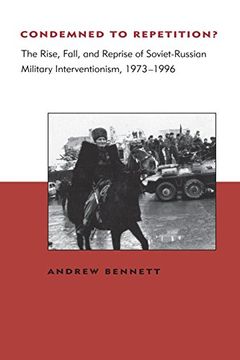Share
Condemned to Repetition? The Rise, Fall, and Reprise of Soviet-Russian Military Interventionism, 1973-1996 (Bcsia Studies in International Security) (Belfer Center Studies in International Security) (in English)
Andrew Bennett (Author)
·
The Mit Press
· Paperback
Condemned to Repetition? The Rise, Fall, and Reprise of Soviet-Russian Military Interventionism, 1973-1996 (Bcsia Studies in International Security) (Belfer Center Studies in International Security) (in English) - Andrew Bennett
$ 45.71
$ 57.14
You save: $ 11.43
Choose the list to add your product or create one New List
✓ Product added successfully to the Wishlist.
Go to My WishlistsIt will be shipped from our warehouse between
Wednesday, June 26 and
Thursday, June 27.
You will receive it anywhere in United States between 1 and 3 business days after shipment.
Synopsis "Condemned to Repetition? The Rise, Fall, and Reprise of Soviet-Russian Military Interventionism, 1973-1996 (Bcsia Studies in International Security) (Belfer Center Studies in International Security) (in English)"
Why did the Soviet Union use less force to preserve the Soviet empire from 1989 to 1991 than it had used in distant and impoverished Angola in 1975? This book fills a key gap in international relations theories by examining how actors' preferences and causal conceptions change as they learn from their experiences. Andrew Bennett draws on interviews and declassified Politburo documents as well as numerous public statements to establish the views of Soviet and Russian officials. He argues that Soviet leaders drew lessons from their apparent successes in Vietnam and elsewhere in the 1970s that made them more interventionist. Then, as casualties in Afghanistan mounted in the 1980s, Soviet leaders learned different lessons that led them to withdraw from regional conflicts and even to abstain from the use of force as the Soviet empire dissolved. The loss of this empire led to exaggerated fears of "domino effects" within Russia and a resurgence of interventionist views, culminating in the Russian invasion of Chechnya in 1994. Throughout this process, Soviet and Russian leaders and policy experts were divided into competing schools of thought as much by the information to which they were exposed as by their apparent material interests. This helps explain how Gorbachev and other new thinkers were able to prevail over the powerful military-party-industrial complex that had dominated Soviet politics since Stalin's time.
- 0% (0)
- 0% (0)
- 0% (0)
- 0% (0)
- 0% (0)
All books in our catalog are Original.
The book is written in English.
The binding of this edition is Paperback.
✓ Producto agregado correctamente al carro, Ir a Pagar.

